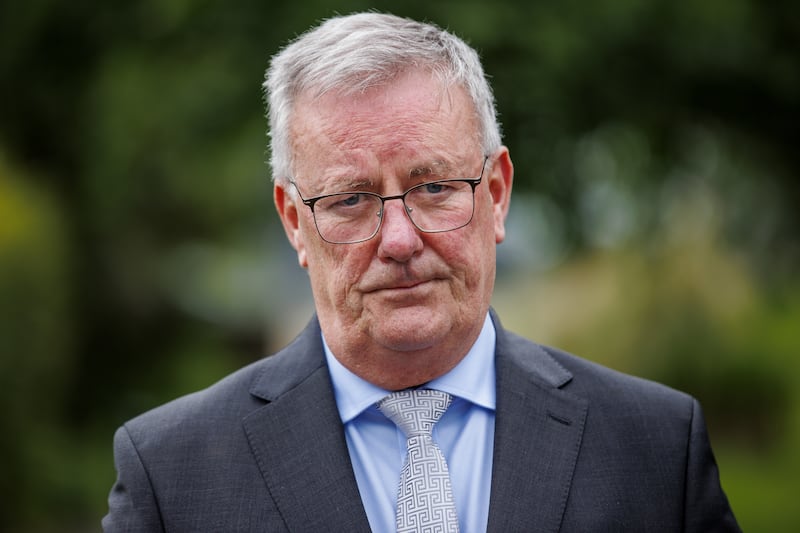A report into bullying among some heart surgeons in the Belfast Trust has concluded “there is little trust between them” and “an ongoing risk to service delivery and patient safety”.
The allegations were first reported in June about staff in the Royal Victoria Hospital’s cardiac surgery unit with claims of bullying of junior staff by senior staff, surgeons working from home and even the throwing medical instruments during operations.
Providing a written update to the Assembly on Wednesday, Health Minister Mike Nesbitt said: “The behaviours detailed in the report were appalling and I committed to urgent action and oversight by way of engaging independent experts to support my Department’s enhanced Support and Intervention processes, which were set at level 5, the highest level, for the Trust.”
 The Royal Victoria Hospital in Belfast.
The Royal Victoria Hospital in Belfast.
The Minister’s written statement to the Assembly outlined how a number of measures have already been implemented. It stated that “a number of actions have already been undertaken, relating to for example, Civility training, Governance and Leadership”. Fortnightly oversight meetings with the Trust have also taken place since then as experts Peter McBride and Dr Jennifer Hill completed their report.
Mr Nesbitt said the “comprehensive report” examined whether the “poor culture and behaviours” in cardiac surgery extended to the rest of the trust, and also critiqued management and governance issues along with how confident staff felt to raise concerns.
An open questionnaire for staff over six weeks resulted in 3,429 responding, 710 providing follow up information and nearly 200 requesting an interview with the experts.
Mr Nesbitt said that Belfast Trust is now expected to show “a significant demonstration of sustained improvement”.
 Health Minister Mike Nesbitt speaking to the media in June after a leaked report into the cardiac surgery unit at Belfast Royal Victoria Hospital (RVH). (Liam McBurney/PA)
Health Minister Mike Nesbitt speaking to the media in June after a leaked report into the cardiac surgery unit at Belfast Royal Victoria Hospital (RVH). (Liam McBurney/PA)
Further detail in the expert’s report noted the “impossible” pressure facing the health system in Northern Ireland, and how some staff had related “extremely distressing accounts of how they have been treated” and how “unfairly and badly” the Belfast Trust has dealt with them.
They added that this must be balanced with “multiple examples of excellent behaviours and actions”.
They also said that cardiac surgical consultants “have continued to question the conclusions and validity” of the original report that identified bullying concerns.
“Our ongoing concern is that, after individual meetings with each of the Cardiac surgeons, the interim (Cardiac Surgery Clinical Director) and the management team, we concluded that there is a fundamental breakdown in relationships between some of the Consultant Cardiac surgeons, there is little trust between them, and consequently there is an ongoing risk to service delivery and patient safety.”
While stating the Trust had made “good progress”, they said “there is still significant risk associated with the dysfunctional team dynamics within the Cardiac surgical team”.
On how the issues of poor cultures and behaviours extended to the rest of the Belfast Trust, the experts acknowledged there would be problems within any organisation of over 20,000 staff.
Other leaders and staff reported “behaviours that fall short of what the organisation expressly expects” and the “distress and pain this causes”.
While this was “disappointing,” the experts said this was not the only narrative and said staff had now felt emboldened into speaking up.
Rates of grievances, disciplinary and bullying/harassment cases were found to have remained steady over the past five years while legal claims by staff against the Trust have increased in this time – mainly from nursing and midwifery as well as medical and dental staff.
Understanding the “anxiety” of staff about the report, the experts said they expected “some perceived defensiveness” because of the otherwise outstanding work and reputation from the Trust.
“The purpose of this exercise is not to diminish this, but to provide additional intelligence from the experience of the significant number of staff who have raised concerns, so that improvements can be made.”
Concluding with a list of 10 recommendations, the Belfast Trust was told to monitor relationships within the Cardiac Surgery Consultant team and their impact on service delivery and patient safety.
Other measures included; having “clear visibility” of areas of conflict within the organisation, committing to a five year “People and Culture” strategy, reviewing Human Resources and improving whistleblowing for staff.
The Belfast Trust was also advised to review its Board Structure, and strengthen its medical leadership.
Belfast Trust Chief Executive, Jennifer Welsh, commented: “The recommendations from this report are a further and important next step in responding to the support and interventions from Minister Nesbitt, which I very much embrace.
“So, we will move forward together, and we will build a workplace that is a safe and supportive environment for all.”


